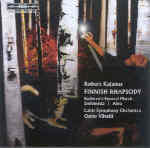At last, Robert Kajanus the composer gets a major release to himself, thanks to BIS. While Kajanus is principally known as a conductor, particularly of the works of Sibelius, this release is quite timely, as those Sibelius recordings don’t hold up terribly well–and if the name of Kajanus is to survive as more than a footnote in the history books, it may well be as a composer first and foremost. Certainly his music doesn’t compare in originality or vision to that of his illustrious compatriot, but on the other hand it’s great fun–good quality Romantic nationalist stuff, with the Finnish Rhapsody No. 1 and the tone poem Aino (Kajanus’ best-known piece) refreshingly “Nordic” in sound and instantly appealing.
Of the two more abstract works, the Sinfonietta dates from 1915, exactly the same period as the premiere of Sibelius’ Fifth Symphony in its original version, and comparison between the two certainly would be embarrassing to Kajanus, even if the piece offers plenty of charm in its own, reserved sort of way (think along the lines of Stenhammar and you’ll get the picture). The real treat here is Kullervo’s Funeral March (1880), in which Beethoven’s Eroica meets Wagner’s Siegfried–and the music’s very derivativeness constitutes much of its appeal. Kajanus adds some very un-Wagnerian (let alone Beethovenian) percussion from bass drum and tam-tam for originality’s sake, but otherwise it’s simply delightful to hear him wanting so desperately to sound just like his beloved models, but trying so hard, always at the last moment, not to do just that.
The performances are just about perfect, as we might expect from the Lahti Symphony Orchestra under Osmo Vänskä. Directly appealing and full of fine playing from winds and strings, the interpretations give Kajanus’ music a welcome opportunity to make the best possible impression. Also par for the course, BIS’ sonics meet the highest standards of the house, with particularly hair-raising climaxes in the Funeral March. This release may represent something of a musical backwater, but its importance in documenting the history of Finnish music isn’t in question. Given the ever-increasing impact and significance of the tradition that Kajanus was so instrumental in creating, his music’s relevance certainly extends well beyond the merely local. A gem!
































